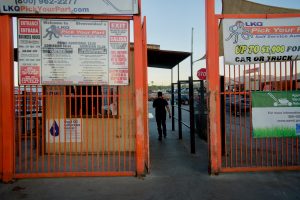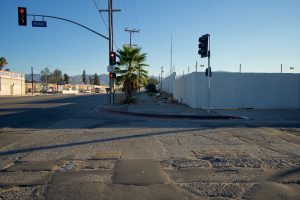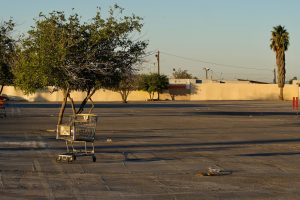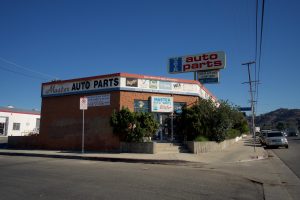My L.A. in Four Locations is a running feature in which Angelenos share the story of their city through four specific places. This week, Robert Matt Taylor takes us on a tour of the Sun Valley’s junkyards.
At the U-Pull yard (or junkyard or wrecking yard or recycler or dismantler), self-guidance is the definitive condition: you pay a small fee at entry, tote your own tools, and you provide the labor to extract what parts you need, in exchange for deep discounts.
The junkyard is, of course, where cars go to die, but it's much more than that — it is a place where some of the least-visible Angelenos go to salvage something usable out of refuse, a stronghold of conservation and self-reliance. It's a classroom for the mechanically-inclined, a natural film set, and a repository of dreams for greasy teenagers (and adults) with shoestring budgets and visions of automotive glory. It is also, very often, the only means by which those obsolete but beautiful artifacts of the high automotive age — by which I mean old cars — can find a way to survive.It is connected, in almost too many ways to mention, to the diverse strands of subculture that form the fabric of our city's identity.
Of the two major hubs of junkyard activity in the city — Wilmington, near the Port of Los Angeles, and Sun Valley to the north — I prefer the northern. To me, the junkyards of Sun Valley offer a picture of what Los Angeles really is, in its estimable dirt and bounty.
11201 Pendleton Street, Sun Valley, 91352 — LKQ Pick-Your-Part — El Pulpo, as it’s known to its mostly Spanish- or Spanglish-speaking regulars, a reference to the rare six-armed octopus of its logo — is actually one of a nationwide chain of auto recyclers, but you would be hard-pressed to find a wrecker that seems more distinctly Angeleno. In this corner of L.A., you’ll only ever hear it referred to as thejunkyard, largely because El Pulpo has for years been grabbing up the smaller and older yards in the area with every spare tentacle. They’re just about the only game in town these days, as self-serve goes, and they know it. Visit during one of their quarterly 40-percent-off sales to witness a veritable Mardi Gras of grease.

11590 Tuxford Street, Sun Valley, 91352 — Opened in 1961, Aadlen Bros. U-Pick Parts was the classical representation of an L.A. wrecking yard, from whence sprang countless thousands of the grass-roots hot rods and lowriders that came to define L.A.’s automotive style to the world. The yard made its first film appearance in the 1967 adaptation of In Cold Blood, and quickly became a favorite shooting location and incidental museum for cast-off props of all shapes and sizes over the ensuing four decades. The most famous of these artifacts, Bruce — one of the original mechanical sharks used in Steven Spielberg’s Jaws — once perched atop a pole near the entrance, frozen in mid-bite. In 2015, plummeting scrap metal prices forced closure. A tire business still operates under the Aadlen Bros. name at the eastern corner of the lot, but the facility is mostly rented for storage now, and scarcely a shadow of its colorful former self.

11311 Pendleton Street, Sun Valley, 91352 — Just up the block from Pick-Your-Part — so close, in fact, that LKQ annexed its parking lot when it moved south to Wilmington, before going out of business altogether in 2006 – was Memory Lane, a pre-1975-only collector car yard. A time-warp in more ways than one, stories abound in local lore of the owner’s irascibility and shady dealings. Most are apocryphal, but one piece of hearsay is certainly true: when the business finally went under, it crushed, with an almost vindictive speed, untold thousands of vintage cars and parts. Today, the old entrance is walled off, and the lot has been absorbed by a cardboard recycling facility.

11087 Tuxford Street, Sun Valley, 91352 — Two blocks to the southeast of the old Memory Lane location sits Master Auto Parts, one of the last remaining independent auto parts stores in the city. Opened in 1968, MAP has become something of a museum of local junkyard history. The artifacts here aren’t physical; business has slowed to the point that MAP has had to pivot to embrace the slicker, more well-monied market of classic car restorers and Hollywood productions, but it remains a vital trading post for the kind of cultural knowledge that is so easily lost in this city, in this time.

Photographs by Kenton Harris.
Robert Matt Taylor is a writer, editor, and part-time mechanic living on the outskirts of Los Angeles. His work has appeared in Narrative Magazine, Sugar House Review, Main Street Rag, and other journals. A recent fellow in Fiction Writing at Chapman University, he is at present a candidate in the Warren Wilson MFA Program for Writers.
At the U-Pull yard (or junkyard or wrecking yard or recycler or dismantler), self-guidance is the definitive condition: you pay a small fee at entry, tote your own tools, and you provide the labor to extract what parts you need, in exchange for deep discounts.
The junkyard is, of course, where cars go to die, but it's much more than that — it is a place where some of the least-visible Angelenos go to salvage something usable out of refuse, a stronghold of conservation and self-reliance. It's a classroom for the mechanically-inclined, a natural film set, and a repository of dreams for greasy teenagers (and adults) with shoestring budgets and visions of automotive glory. It is also, very often, the only means by which those obsolete but beautiful artifacts of the high automotive age — by which I mean old cars — can find a way to survive.It is connected, in almost too many ways to mention, to the diverse strands of subculture that form the fabric of our city's identity.
Of the two major hubs of junkyard activity in the city — Wilmington, near the Port of Los Angeles, and Sun Valley to the north — I prefer the northern. To me, the junkyards of Sun Valley offer a picture of what Los Angeles really is, in its estimable dirt and bounty.
11201 Pendleton Street, Sun Valley, 91352 — LKQ Pick-Your-Part — El Pulpo, as it’s known to its mostly Spanish- or Spanglish-speaking regulars, a reference to the rare six-armed octopus of its logo — is actually one of a nationwide chain of auto recyclers, but you would be hard-pressed to find a wrecker that seems more distinctly Angeleno. In this corner of L.A., you’ll only ever hear it referred to as thejunkyard, largely because El Pulpo has for years been grabbing up the smaller and older yards in the area with every spare tentacle. They’re just about the only game in town these days, as self-serve goes, and they know it. Visit during one of their quarterly 40-percent-off sales to witness a veritable Mardi Gras of grease.

11590 Tuxford Street, Sun Valley, 91352 — Opened in 1961, Aadlen Bros. U-Pick Parts was the classical representation of an L.A. wrecking yard, from whence sprang countless thousands of the grass-roots hot rods and lowriders that came to define L.A.’s automotive style to the world. The yard made its first film appearance in the 1967 adaptation of In Cold Blood, and quickly became a favorite shooting location and incidental museum for cast-off props of all shapes and sizes over the ensuing four decades. The most famous of these artifacts, Bruce — one of the original mechanical sharks used in Steven Spielberg’s Jaws — once perched atop a pole near the entrance, frozen in mid-bite. In 2015, plummeting scrap metal prices forced closure. A tire business still operates under the Aadlen Bros. name at the eastern corner of the lot, but the facility is mostly rented for storage now, and scarcely a shadow of its colorful former self.

11311 Pendleton Street, Sun Valley, 91352 — Just up the block from Pick-Your-Part — so close, in fact, that LKQ annexed its parking lot when it moved south to Wilmington, before going out of business altogether in 2006 – was Memory Lane, a pre-1975-only collector car yard. A time-warp in more ways than one, stories abound in local lore of the owner’s irascibility and shady dealings. Most are apocryphal, but one piece of hearsay is certainly true: when the business finally went under, it crushed, with an almost vindictive speed, untold thousands of vintage cars and parts. Today, the old entrance is walled off, and the lot has been absorbed by a cardboard recycling facility.

11087 Tuxford Street, Sun Valley, 91352 — Two blocks to the southeast of the old Memory Lane location sits Master Auto Parts, one of the last remaining independent auto parts stores in the city. Opened in 1968, MAP has become something of a museum of local junkyard history. The artifacts here aren’t physical; business has slowed to the point that MAP has had to pivot to embrace the slicker, more well-monied market of classic car restorers and Hollywood productions, but it remains a vital trading post for the kind of cultural knowledge that is so easily lost in this city, in this time.

¤
Photographs by Kenton Harris.
¤
Robert Matt Taylor is a writer, editor, and part-time mechanic living on the outskirts of Los Angeles. His work has appeared in Narrative Magazine, Sugar House Review, Main Street Rag, and other journals. A recent fellow in Fiction Writing at Chapman University, he is at present a candidate in the Warren Wilson MFA Program for Writers.
LARB Contributor
Robert Matt Taylor is a writer, editor, and part-time mechanic living on the outskirts of Los Angeles. His work has appeared in Narrative Magazine, Sugar House Review, Main Street Rag, and other journals. A recent fellow in Fiction Writing at Chapman University, he is at present a candidate in the Warren Wilson MFA Program for Writers.
Did you know LARB is a reader-supported nonprofit?
LARB publishes daily without a paywall as part of our mission to make rigorous, incisive, and engaging writing on every aspect of literature, culture, and the arts freely accessible to the public. Help us continue this work with your tax-deductible donation today!
:quality(75)/https%3A%2F%2Fdev.lareviewofbooks.org%2Fwp-content%2Fuploads%2F2019%2F01%2F4-Master-Auto-Parts.jpg)